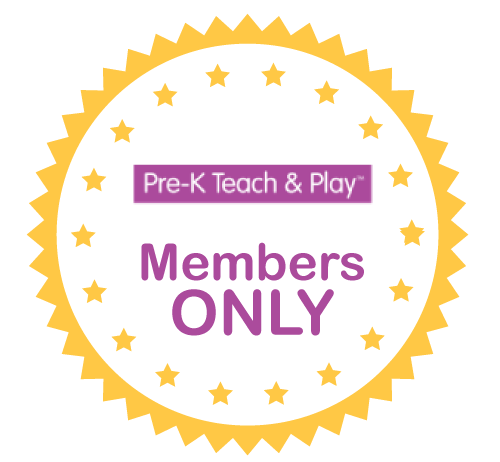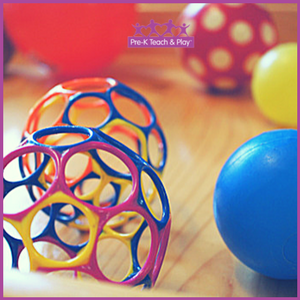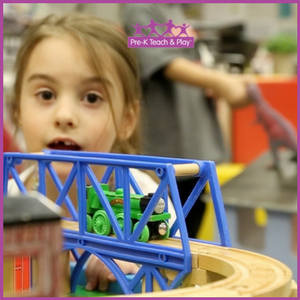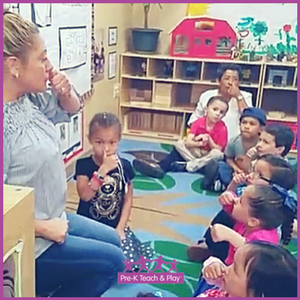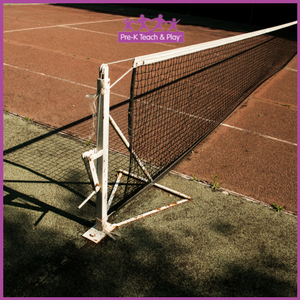ECE Solutionary Membership Resources for Month 8
This month, I've hand-picked solutions from the categories of the power of play, self-regulation, and mindfulness. Each solution is provided to help you go deeper into the "how" behind helping children thrive in school and in life.
Click here to download this month's at-a-glance handout
As always, each solution includes a brief description and hyperlink to a PDF, YouTube video, blog post, podcast, and/or website. For those who end up feeling like the solution was TL;DR (too long; didn't read), I provide an at-a-glance tip you can put into action immediately. Each tip is signified by a purple hashtag (#prektip).
Power of Play Solutions
This previously recorded webinar provides a context for seeing authentic assessment as the means by which we get to know children and foster their development and learning. Recommended practices and research on how to assess children during play are provided [link]- presented by me and sponsored by the Military Families Learning Network (MFLN)
Want even more? Visit the PreK Teach and Play ECE Solutionary library for other webinars [link], and this mp4 for a follow up to Have a Seat! [link]
#prektip: Assess young children in familiar settings, with familiar people, doing familiar things (click here to tweet this!)
This article provides specific tips and actions families and caregivers can use to promote play skills (especially among those who struggle with it) and to authentically assess children during play [link]- written by me
#prektip: Adjust the frequency of requests and questioning to minimize any disruption of the child’s internal regulation and/or attention (click here to tweet this!)
Self-Regulation Solutions
This podcast from Synergy Autism Center discusses how to address situations in which a child refuses and behavior escalates, such as those times when a child does not want to join a group. Tips for writing applicable IEP/IFSP goals are also provided (link)- recorded by Barbara Avila in conversation with me
#prektip: When a child refuses, be kind and gentle, but firm; keep your expectations high but the task or directions simple (click here to tweet this!)
This article talks about the importance of love, support, and comfort being given freely in order to support optimal child development [link]- written by Sara @ Happiness is Here
#prektip: It’s possible to empathize with your child’s feelings without changing your mind on something that you have decided is non-negotiable (click here to tweet this!)
This blog describes how relationships are related to brain development [link]- written by Lori Desautels
#prektip: As Lori Desautels states, “A child who has never been loved cannot love! A child who has not been the recipient of kindness and compassion has not formed the receptors in the brain responsible for showing kindness. Our relational neurobiology matters more than anything else to our mental, emotional and physical health!” (click here to tweet this!)
This blog discusses a news story from May 2017 about teachers leaving Wichita schools because the children are “out of control”. ‘Teacher Tom’ talks about why the children may be “out of control” (and it may not be what you think!) [link]- written by Teacher Tom (Tom Hobson)
#prektip: Children's behavior is a natural, predictable response to the cage in which they are forced to spend their days- Teacher Tom (click here to tweet this!)
Mindfulness Solutions
This podcast explores what Circle Time, science, mindfulness, and self-reflection have in common [link]- recorded by me, featuring Laura Fish
Want even more? Check out the following complimentary resources:
- Engaging in Meaningful Self-reflection- a Framework by Laura Fish (opt-in for non-ECE Solutionary Members) [link]
- Mindful Circle Time with Preschoolers (Youtube video from Laura Fish) [link]
- You are Here (LinkedIn article coauthored by me and Laura Fish) [link]
This article provides five steps you can use to practice “serve and return” with a child, a best practice involving lots of back and forth interaction between children and adults that ensure a relationship that is responsive and attentive [link]
#prektip: Supporting and encouraging rewards a child’s interests and curiosity. Never getting a return can actually be stressful for a child. When you return the serve, the child knows that his thoughts and feelings are heard and understood (click here to tweet this!)
